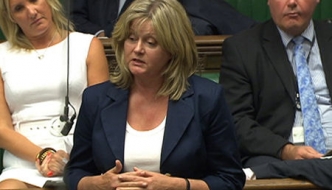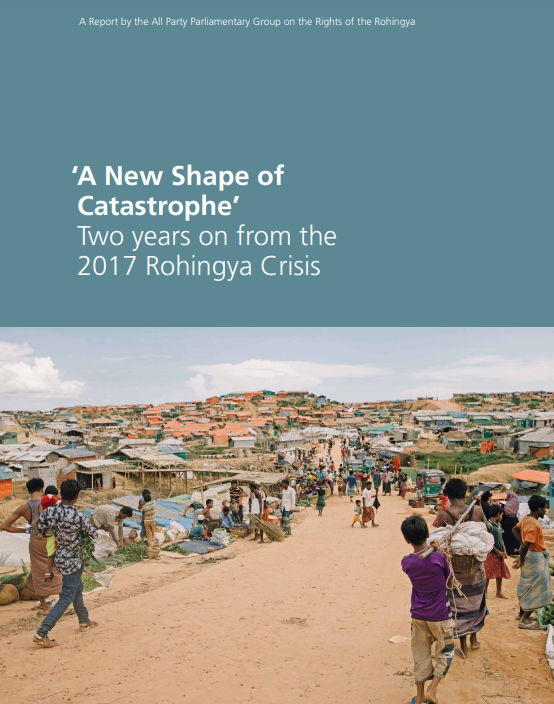Aid must help the ‘needy and not to the greedy’ says Anne Main
Anne Main calls for better scrutiny of development projects following concerns raised in the Independent Commission for Aid Impact (ICAI) on DfID’s approach to anti-corruption and its impact on the poor.
Anne said ‘Given that so many aid programmes are showing as either amber/red or red, it is important that we ensure that taxpayers’ money goes to the needy and not to the greedy.’
Mrs Anne Main (St Albans) (Con): I will be brief because I know that there are other colleagues who wish to speak. We would be doing a disservice to the House and to members of the public if we did not point out that there are some serious concerns about the way that aid is used. We are not expecting people not to want to help the poor; we want to help the poor. I went through all the reports today, and I am sorry to say that, under the transparency of assessment of the programmes, so many of the programmes are failing to deliver aid because of problems with corruption and problems in those countries. Today, we owe it to people to scrutinise what is being spent on behalf of the British public.
Stephen Doughty rose—
Mrs Main: I am sorry but I will not give way, because the next speaker will be an Opposition Member and so many Government Members wish to speak.
On the work just in southern Africa, ICAI has said:
“The shortcomings that we saw in the programme and its serious deficiencies in governance; financial management; procurement; value for money; transparency of spending; delivery and impact, as well as its failure to use DFID’s body of knowledge in trade and poverty, have led to a marking of Red for the programme.”
The public expect us to be helping the poor and needy; they do not expect this. If Opposition Members have not been through the aid programmes, I would ask them to do so, because there are serious concerns about people lining their pockets and corruption. It is very difficult to get this sorted. Unfortunately, some of the reforms are not being put in place in some of the other countries. I suggest that before we start throwing more money at the problem, we help DFID by scrutinising these aid projects, and ensuring that the money we currently spend is well spent and getting to where it is supposed to go. I am pleased that DFID has dropped the innovative side of trying to find things to throw money at, because, unfortunately, “innovative” was not always in the best interests of the poor.
Philip Davies: Is it not worse than that, because the money resolution we are discussing is not about giving any more money to anybody in need or in any overseas development—it is about creating a whole new organisation of bureaucrats? That is what we are being asked to pass; it does not give any help to anybody in need.
Mrs Main: My hon. Friend is absolutely right about that. The report published on 31 October says:
DFID has not…developed an approach equal to the challenge, nor has it focussed its efforts sufficiently on the poor. While some programmes show limited achievements, there is little evidence of impact on corruption levels or in meeting the particular needs of the poor.”
Surely that is what all of us are interested in, rather than just throwing money at the matter. I will bring my remarks to a close, but I caution against rushing this through before we tackle the fact that we are not delivering money to the poor.
8.40 pm
...
Mrs Anne Main (St Albans) (Con): I am sorry if I sound unhelpful but I have gone through every report in the independent audit and there are things that will concern the public, such as the review of the trade development work in southern Africa where we have discovered a payment to the Government of Zimbabwe in contravention of UK Government policy. We do need to keep tight control over money that is spent, or the taxpayer will feel that they are being fleeced.
Mr Swayne: It is vital that these matters are investigated and answers are given and that proper schemes are in place and enforced to ensure that the money is spent correctly. The purpose of this money resolution, however, is to give effect to the will of the House, clearly expressed in September, that this Committee proceed.
...
Mrs Main: I hope that the hon. Gentleman will accept the words of the previous Minister of State, my right hon. Friend the Member for Rutland and Melton (Sir Alan Duncan), who said:
“it would be fruitless for us to invest in aid to relieve the plight of the poor in the short term if we did not seek to bring about lasting change.”
He went on to emphasise the importance of tackling corruption. Given that so many aid programmes are showing as either amber/red or red, it is important that we ensure that taxpayers’ money goes to the needy and not to the greedy.
Gavin Shuker: It is hugely important to ensure that aid gets to the right people. Indeed, the reports to which the hon. Lady referred in an earlier intervention make it clear that those who lose out the most are the poorest people in the poorest parts of the world where there is the most corruption. It is up to the Government to defend those people. I want to be generous and say that this challenge is faced by all developed nations when rolling out their aid programmes. I also agree with the hon. Lady about spending the money effectively, which is why I believe we can do much more to make the Department for International Development a real force for good in the world in relation to global institutional reform. It should not simply be the charitable arm of the UK Government. That should be our focus as we take the Bill through Parliament.
...
Mrs Main: The hon. Gentleman mentioned Africa. One of the commissioners of the Independent Commission for Aid Impact, Diana Good, who oversaw its work there, said:
“We had a number of grave concerns, from the £67 million unused money and misreporting to excessive expenses, against the background of a programme which was regarded as a flagship but failed properly to take into account the impact on the poor. DFID just relied on the assumption that the poor would benefit”.
We owe it to the British taxpayer to ensure that the poor are helped, not just to assume that they are being helped.
Gavin Shuker: We absolutely do. The hon. Lady makes an extremely good case for additional scrutiny. The Opposition hope that we do scrutinise the Department for International Development effectively. I simply point out that as we discuss this money resolution for a Bill about the total size of the envelope, we must not lose our sense of momentum in holding the Government to account. However, I say to the hon. Lady that those are slightly separate issues, and it would be good for the House if we made progress on the resolution.

DISSOLUTION OF PARLIAMENT
Watch: Anne Main, chair of the All Party Parliamentary Group on Bangladesh, talks about the Rohingya crisis and urges support for @DECappeal pic.twitter.com/FFL0lq8O0A
— DFID (@DFID_UK) October 12, 2017

